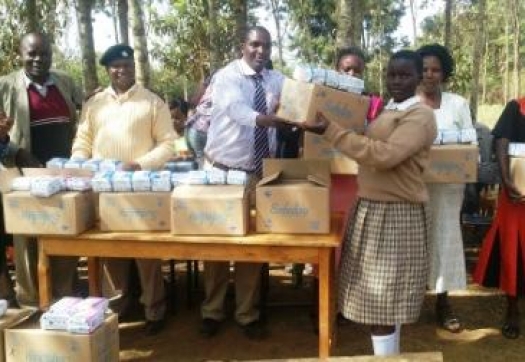Sanitary Towels Provision to the Less Privileged
Fundraising campaign by
SafeworldEnterprises
-
US$0.00raised of $50.00 goal goal
No more donations are being accepted at this time. Please contact the campaign owner if you would like to discuss further funding opportunities
Kenyan girls are today faced with a number of challenges. One, most female students in the rural and slum areas cannot afford the monthly purchase of sanitary pads. For some of the adolescent girls in the marginalised regions, ‘Sanitary pad/towel’ is a foreign concept to them. Having no other option, the girls opt for other various means that are uncomfortable and unhygienic especially during the menses. During this period, many of them miss school on average 3-5 days every month because of the discomfort and embarrassment associated with the menses. If they are obliged to attend school, chances are that they remain distracted and fail to pay attention to their studies which consequently results in poor performance. Objective As an organization, a nation and the global fraternity, we should greatly appreciate this huge need and be part of the solution. It is therefore, our obligation to ensure that girls are comfortable during their menses and none should miss school or be preoccupied while attending. Research has shown that 65% of the Kenyan women and girls live in the rural and slums and cannot afford sanitary towels. It has also been established that during this puberty period, most girls drop out of school or circumstances force them to miss school for a significant period of time. Approximately 2.5 million girls miss 6 weeks of school annually and women miss a significant period of working hours. Menstruation causes Kenyan adolescent girls to lose an average of 3.5 million learning days per month. Limited access to safe, convenient, affordable and culturally appropriate methods for dealing with menstruation has far reaching implications for the physical, social and mental well-being of many adolescent girls in Kenya and other developing countries as well. It undermines sexual and reproductive health and has been shown to restrict access to education. Faced with the complete lack of sanitary pads, this can only mean that the girls miss school for considerable period of time and this has negative impact on the quality of learning they receive, their overall academic performance, their retention and transition through the education system. UNESCO estimates that one in 10 African adolescent girls miss school during menses and eventually drop out because of menstruation related issues. The inaccessibility of menstrual products results in embarrassment, anxiety and shame when girls and women stain their clothes, which is stigmatising. Once girls start missing school they are far more likely to be exposed to other risks such as early pregnancy and marriage, HIV/AIDS and female genital mutilation. Cases of women and girls using unhygienic methods to keep themselves dry during their menses are so common in Kenya especially among the rural poor households and marginalised communities. Some cast by the embarrassment, use leaves, rags, animal skins and even chicken feathers. In the extreme cases, in selected cultures they dig holes and sit on them for all the days they are on their flow calendar. Citizen TV, a media house in Kenya, highlighted a story on how students of Marigat county have turned into desperate unhygienic measures of control during menses cycle. Women and girls in Marigat, Kampi ya Moto and Mogotio were using leaves, rags and others soil. Others cover their lower part with dried banana fibre but this does not control the flow or keep them dry. Most rural women and adolescent girls have limited knowledge concerning their bodies reproductive system and menstruation. Furthermore, the topic is treated with silence since traditions view menses blood as unclean and harmful. This has limited women from the marginalised regions rights to access quality education about their bodies. Even in schools, there is lack of physiological education since the male teachers predominantly shy away from teaching on the subject. Older women (aunts and grandmothers), who are considered ‘wise counsellors’ are uneducated and mostly they recount myths that are biologically incorrect. To make an impact in our society, Safe World Enterprises therefore decided to consider provision of affordable sanitary pads to the needy/ under privileged female fraternity in Kenya. The company established in 2012, does so by making this their key corporate social responsibility agenda. Due to financial limitations, the company is only able to achieve this objective by reaching out to other companies or individuals with a similar vision. In addition to educating the girls on reproductive health, the company also educates the communicates on HIV/AIDS, dangers of Female Genital Mutilation (FGM), Drugs and Substance abuse and career development for the school going population. Kindly donate towards this noble project.
Organizer
- SafeworldEnterprises
No updates for this campaign just yet



